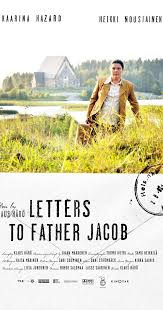A little gem from Finland. A blind Lutheran priest takes on as an assistant a paroled murderer, Leila. Father Jaakob has a reputation as an intercessory, I.e., he prays for people and offers advice to those who write to him. While no time period is given it looks like the 1950s. He lives in a forest near a church on a lake. Nature dominates the time and the day.

His only contact with the outside world is the post and the postman. The pastor has long since given up preaching because of blindness, and he lives for those letters.
Leila is angry at the world and makes no effort to cooperate though she is glad to be out of the slammer. She is neither particularly bright nor attractive, and expects people to dislike her. They oblige in the person of the postman.
At first she thinks either the priest is shamming or is a fool. In time she comes to respect, if not share, his faith in a meaningful world. Or so I surmise because the dialogue is like much from Finland, practical and not introspective. And there is little of it. Much is told by the camera.
She also realises that he needs her if he is to live – she reads the letters to him and he needs those letters, just as the writers need him. And she also learns she owes not only her freedom to him, but more, too. No spoiler. His previous letter-reader left for the city to take care of grandchildren.
For some reason never explained the letters dry up and that brings the needs of each to the forefront. Earlier she destroyed some of the letters and perhaps his consequent failure to respond to those, discouraged others from writing. It is not clear, nor need it be. Little of life is that, clear.
In fewer than eighty minute there is more about life in this film than the latest CGI-infected three hour Hollywood brain-buster.
 Klaus Hãro, the director.
Klaus Hãro, the director.
It earned place on my list of Finnish movies along with
Leningrad Cowboys (1994)
The Man without a Past (2002)
Vares (2004)
The House of Branching Love (2009)
Rare Exports (2010)
Midsummer night’s tango (2013)
Top marks must go to ‘Rare Exports.’
Skip to content
